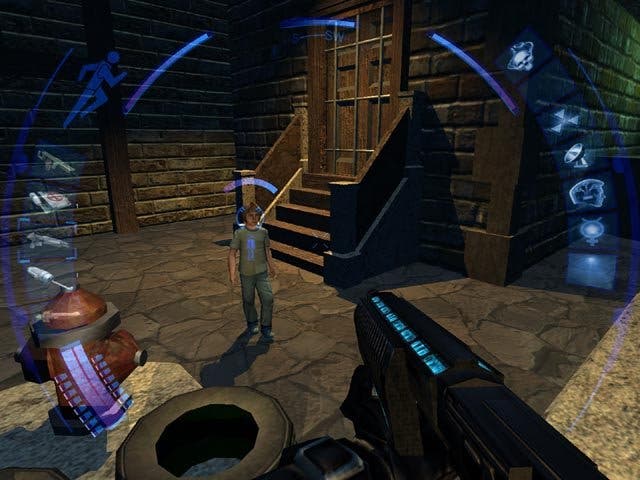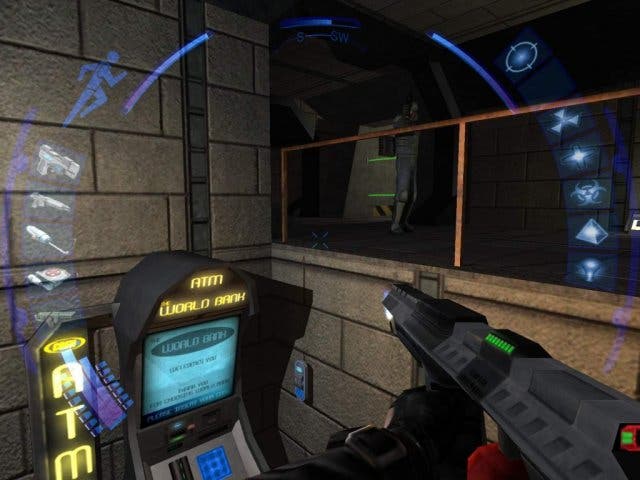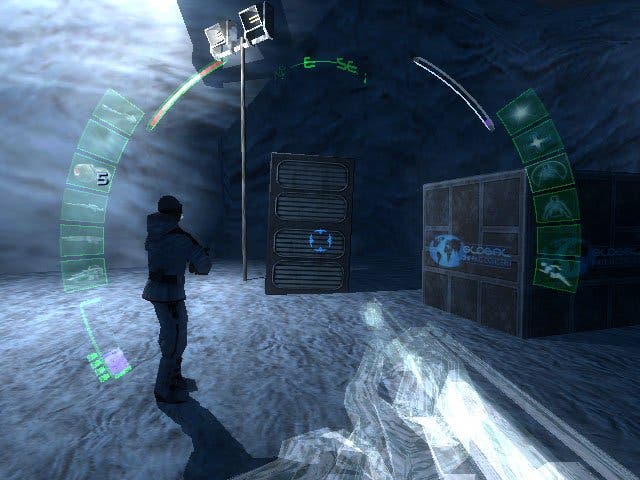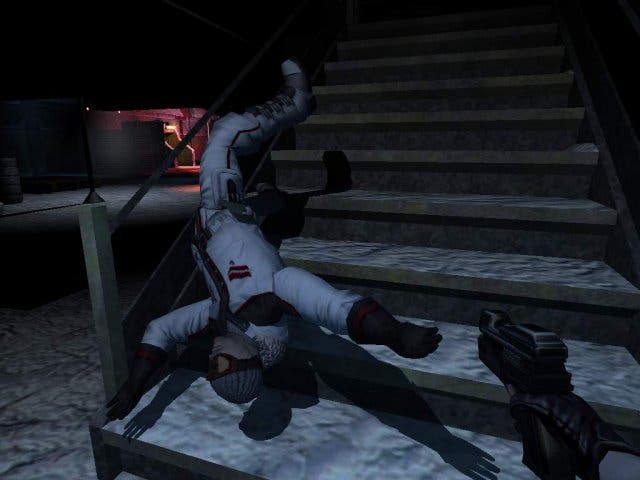Deus Ex: Invisible War
War is upon us. Or is it? You decide.
Some people just aren't good at making decisions. If you find yourself confounded by the choice of washing up liquid or cheese varieties in your local supermarket, or can't make up your mind which movie to watch on an evening in, then Deus Ex: Invisible War might not be the game for you - since for a change, this is a game which really presents you with a lot of decisions to make. Rather than presenting you with a linear selection of puzzles to solve, targets to shoot or platforms to jump on, Invisible War allows you to pick your own path through the game - or at least, that's the theory.
Tangled Web

You start out the game, following an introductory cut-scene in which your home city of Chicago is destroyed by a nano-bomb that smothers the entire city in a swarm of destruction, by waking up in a secure facility in Seattle. You are a trainee of a company called Tarsus, equipped with bio-modification technology that allows your abilities to be upgraded using special canisters of nano-machines - giving you abilities such as enhanced vision, boosted strength or even cloaking and stealth.
Although the first portion of the game, which takes place entirely within the Tarsus Academy (now under attack from a religious fanatic group called the Order) is quite linear, even here you can start to see the sort of gameplay which is going to open up later in the game. When enemies appear, you can slip around them silently or engage them in combat; when hostile gun turrets, security cameras and locked doors bar your way, you can usually get past in a number of different ways, such as crawling through vents, hacking security computers, disabling cameras or locks with multi-tool devices, knocking out electrical equipment with EMP charged weapons or grenades, or simply blowing stuff up with explosives.
This is a pattern which is repeated throughout the game, and as you gradually upgrade your bio-mod abilities, you'll probably hit on a combination of solutions which works best for you specifically. You only have five slots for bio-mods, but there are fifteen possible mods, so you can only choose one out of each group of three - meaning that your character ends up pretty effectively customised. Focus on stealth abilities and you'll be able to sneak your way through the game, focus on hacking abilities and you'll turn your enemies' own defence systems on them, focus on combat and health regeneration and you'll be a lethal combatant - or choose a mixture to suit your own play style.
Illuminating

On a higher level than that, the game is also about choices. Once you leave the Tarsus facility, you're set loose on the streets of Seattle - and from here on you'll be given mission objectives by a large number of different people, often with conflicting interests. In some cases you'll be able to complete even conflicting objectives and gain the rewards for both, but in general you'll have to pick and choose, thus risking annoying some factions in the game. Initially, the two main factions in play are the Order, a religious group headed up by a mysterious figure called Her Holiness, and the WTO, a powerful organisation which runs the main enclaves of high technology and civilisation in this post-apocalyptic world.
For the most part, the game is made up of missions which will be performed for these factions, for other individuals and for other factions which emerge later in the storyline. You arrive at a new location - there are three cities in the game, and several other smaller locations - and are given a selection of missions to accomplish, which you do and then move on to the next city. It's a simple enough structure, but the mutually exclusive missions make it interesting - as does the fact that characters and factions do remember what your actions towards them previously have been, and will act upon them.
However, the game isn't really all that non-linear, although it does a pretty good job of pretending to be. No matter which faction you side with, you'll still end up moving through the areas in the game in a strictly set order, and in general you'll be offered the same missions. As such, although the first time you play the game it certainly feels like you're being given a great deal of freedom, the second time through will be eerily similar even if you make a set of entirely different decisions - in most cases, only the dialogue will actually change.
The Illusion of Choice

This problem is perpetuated not only in the big decisions about what faction to side with, but also in the smaller gameplay decisions. Although we enjoyed playing the game thoroughly for the 12 hours or so that it lasted, by the latter half of the game it had settled into a fairly rigid formula in gameplay terms, with only the narrative to drive it forward. With fully powered up bio-mod abilities from only a few hours into the game, there's little more room for your character to develop (only two new weapons show up in the latter stages of the game, and no new abilities), and the majority of obstacles in the game have a small selection of blatantly obvious ways around them which are replicated over and over again.
This may sound like a real killer for the game, but it shouldn't be considered as such. In fact, many areas remain challenging, because you need to keep an eye on things such as your ammo, the number of multi-tools in your stockpile and your bio-electricity levels (used to power bio-mod abilities). As such, the challenge becomes finding the most efficient way through an area - avoiding unnecessary confrontation or wasteful use of resources. This style of play, along with the compelling narrative and the stacks of side-missions, make sure that the game remains interesting right up to the very end.
Graphically, Invisible War isn't the best looking game on the Xbox, but it certainly has some very nice tricks up its sleeve. The game environments and characters are relatively low detail, but in return you get superb shadows and bump mapping, which combine to create a very attractive effect. Characters in particular look superb thanks to the shadows, while the bump maps make buildings and machinery look far more detailed. The game does have some frame rate problems, but they don't really interfere with the play experience since the combat model is really just a case of pointing in broadly the right direction and pulling the trigger - no twitch reaction gaming instincts required.
Sins of the Fathers

Although many players of Invisible War will probably be new to the Deus Ex series - and it does do quite a good job of explaining the key events from the first game, which took place twenty years previously, with central character JC Denton triggering the apocalyptic "Collapse" at the end of the game - the real question that most readers will probably want answered is how this compares to the original Deus Ex. That was always going to be a tough comparison, since Deus Ex is widely regarded as a defining moment for PC games and was indeed one of the first (and only) games that we ever awarded a 10/10 score on this site.
In fact, Invisible War holds its own in a number of areas, although it's certainly a letdown in others. The game has been designed to work with a joypad this time around, which has forced the team to tone down the skill level of combat - not a bad thing at all, since this isn't the sort of game where you want your careful planning to be destroyed by a gammy wrist failing to flick the crosshairs around fast enough. It's also forced a rethink of the interface as a whole, and the whole "less is more" approach here is very welcome - with a vastly simplified inventory and menu system, as well as a unified ammo system (where every gun uses the same type of ammunition) that makes a lot of sense in practice. The branching storyline is also handled much better than in the original Deus Ex, and there are far more genuine choices to be made here, making the game overall much more open and interesting than its predecessor.
However, in other areas, Invisible War has noticeably worsened in comparison with its older sibling. One key complaint is the size of the levels in the game - with "cities" seemingly consisting of only four or five shops and two apartment buildings, and every area in the game being incredibly enclosed and claustrophobic. The original Deus Ex wasn't exactly a monster in terms of level sizes, but they were a lot more impressive than these. This may go some way towards explaining why the bio-mod system has lost some of its most interesting tools, in fact - with abilities such as boosting speed and jumping power gone entirely, for example.
The bio-mods in Invisible War simply aren't as much fun as in Deus Ex - we still have fond memories of leaping from building to building in Hell's Kitchen like something out of the Matrix, taking down troops below with the sniper rifle and then dashing to the other side of the district, leaping across streets with ease, to avoid their returned fire. There's simply nothing like that in Invisible War - your bio-mods do offer some fun abilities, like the vaguely macabre ability to absorb life energy from corpses (try not to disturb people nearby by announcing "I will feast on your flesh!" in an all-too-happy tone while doing this), but the ability to customise your character is incredibly limited by comparison with the previous game.
Decisions, decisions
Fundamentally, Invisible War has chosen certain aspects of the Deus Ex experience to focus on to the exclusion of others. This second instalment in the series is certainly an excellent game, but in becoming a much more accessible and polished title than its predecessor and taking significant advances in storytelling, it has left behind some key aspects of gameplay and much-loved variety from the first title. Not everyone who played the first game is going to take kindly to the decisions that Ion Storm Austin made in the creation of this game - but even if Invisible War isn't exactly Deus Ex, and certainly isn't as inventive and enjoyable as Deus Ex, it would be simply churlish not to acknowledge that it's a superb game in its own right, and one which will be enjoyed by most fans of the first game, as well as - hopefully - by a lot of complete newcomers to the paranoid conspiracy theory heaven that is the Deus Ex universe.








